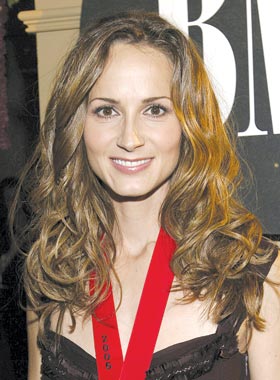The country music star and out lesbian may be busy with a new album and tour, but she always makes time for her new-found passion for advocating for LGBT equality
Rich Lopez | Staff Writer lopez@dallasvoice.com
When Chely Wright came out this summer, the buzz in the music industry was mixed. But as it turned out, she did it at precisely the right time.
Combining her star power with advocacy, Wright has become the face of the Gay Lesbian Straight Education Network and an outspoken advocate for her new-found community. She has stepped up to the plate and used her stature to focus attention on LGBT issues.
The buzz around Wright’s coming out was quickly eclipsed by head-grabbing issues like same-sex marriage rulings, “don’t ask, don’t tell” and the rash of gay youth suicides and bullying.
Still, Wright interjected herself into the conversation and people listened, while other gay celebrities were being supportive, but perhaps less vocal. For her efforts, Wright will be awarded the 2010 Media Award at this weekend’s Black Tie Dinner.
“This is what I felt like I was supposed to do, and it would be wrong of me not do this,” Wright said recently of her work in the community.
Black Tie Dinner co-chairs Ron Guillard and Nan Arnold said that Wright was the unanimous choice for the Med Award this year. As the year progressed, Wright’s work with LGBT youth and her public profile narrowed the choices tremendously until she became the decisive choice.
“The breadth of her activity immediately upon coming out was definitely a factor. She faced issues head on and she’s made an incredible impact in reaching Middle America,” Guillard said.
Wright has most recently chosen to become involved in addressing the seemingly skyrocketing rate of bullying and LGBT youth suicides. Her work with GLSEN helped launch the Safe Space Campaign for schools to provide outright support to gay students and end anti-gay harassment and bullying. She joined a panel of celebrities on Larry King Live calling attention to the issue — which she stressed isn’t new.
“What’s going on now is not a shock to me. The problem isn’t a fresh one. It’s just that now, we have the mainstream media’s attention,” Wright said.
She quoted Kathy Griffin from that panel, agreeing with the comedian that bullying is based in homophobia stemming from a bigger picture that paints a distinct portrait to both straight and gay communities. “I hadn’t thought about it until she said
something amazing. She called it ‘trickle-down homophobia,’ where gay issues and headlines meet. DADT is denied, marriage denied and we’re constantly told we’re ‘less than,’” Wright said. “Not only bullies are hearing that, but young gay people are too.”
And that gives LGBT youth a bleak outlook on their future, while at the same time emboldening the bullies, Wright said.
“We can tell people not to bully, but when mandates are coming down against our rights and headlines show that, how can we expect them not to, when Congress is doing it blatantly?” Wright asked.
When she wrote her autobiography Like Me, Wright’s publishers balked at the chapter on hate crimes. She fought Random House for the chapter to be included, despite them telling her it was too dramatic. In the end, Wright won and the chapter, “Hate Crimes are Down?,” foreshadowed the current issue of harassment.
“If you push a young LGBT person to the point where they take their own lives, it’s a hate crime. If you get them to kill themselves, that’s a hate crime. You aren’t connecting dots that are too far apart and now it’s horrific that it’s come to past,” Wright said.
Wright focused on the Rutgers student Tyler Clemente, who committed suicide by jumping off a bridge after his roommate recorded him having sex with another man and streamed it online.
Wright said she faced a similar fear of being outed in the middle of her conservative country music career.
“I know what he felt like and it ripped my heart out,” she said of Clemente. “When you don’t want anyone to know that secret, the thought that runs through your mind is to jump, or pull the trigger. I couldn’t bear someone in control of my timeline for that secret,” she said.
Wright has been open about her faith as well, which brings a fairly new facet to the openly gay celebrity. Where most might dismiss religion as a hindrance, Wright seems to want to let people know that being gay and being religious are not mutually exclusive.
But at the same time, she said it is religion that is responsible for so much bigotry.
“Churches are not being held accountable. They tell young people they are damaged goods,” Wright said. “They tell them not to shoplift, which is a question of morality and making the right decision. But when they tell them not to be gay, that sets them onto a path of self-loathing and hatred and it’s contrary to a healthy life.”
Along with GLSEN and the Human Rights Campaign, Wright has given her support to the nonprofit organization Faith in America, which works to counteract the discrimination by religious communities toward the LGBT community.
“When you tell a kid he can’t be that way, it’s just a problem. We have got to hold churches accountable,” Wright repeated. “Really, you can be a good Christian and a gay person,” she said.
Arnold sees how Wright’s passion led to the board’s decision to honor her with the award.
“She is setting a wonderful example for people of all ages right now in this critical time. She’s appreciated the community and we appreciate what she’s doing for it,” Arnold said.
With her political advocacy, it’s easy to forget what Wright does best. She is still making music, but now balances what she loves to do and what she’s called to do.
“At the root of what I do, I like to sing and make records,” Wright said. “But we do the most damage as humans with words. And I’m compelled to support kids as they turn into grownups and help them keep their heads on straight.”
So to speak.
This article appeared in the Dallas Voice print edition November 5, 2010.


















Yes. !! You did make the “Right ” decision in selecting CHELY … She deserves the Honor as
a Champion on the Front Line as an Activist .
I hope that the ” Dallas Voice ” and ALL other Channels of Media will continue to Publish “OUR”
Cause … This is the only way I believe we can ever hope that ” People ” ?! Will get educated and hopefully one day come to realize that indeed ” WE ARE BORN THIS WAY “!!!!!!!!!!!!!!!!!!!!!!!!!!!!!!!